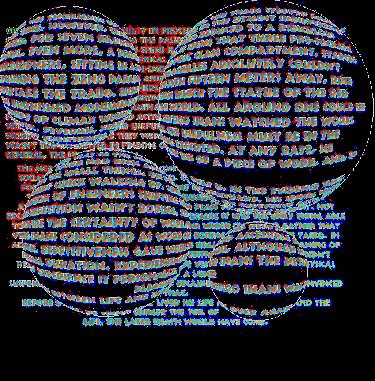|
Given the enormous difficulty in proceeding, the train stopped abruptly (this time, however, leaving the passengers in the utmost indifference. Indeed, for seven kilometers speed had been reduced to a ridiculous crawl. Even more, a philosophical one. It seems that three pre-Socratic philosophers,
sitting in a non-smoking first class compartment, started discussing the Zeno paradox, and how Achilles absolutely couldn't overtake the train). Right there, not even fifteen meters away, rose the burnished monumental bridge from which the statue of the Red Pontiff of Climax would dominate the world. All around one could see frenetic, feverish, frenzied activity. Vestigo Inani watched the works
without questioning their usefulness. The usefulness must be in the works themselves, since they were being executed. At any rate, he wasn't too interested in finding out the use of a piece of work. And, in general, the use of........................................................winge social context. That is, in the evidence that,
socially,rk had been accepted. ...................................................on
smallthings, n present chores, on repetitive acts: the waiters' quickwalking by,the unloading of cement mixers, the attention of engineers shifting from plan tofinished product. Not because repetition wasn't boring - this IS boring and I'll bet that you've either got nothing better to do with yourt ime or are an arty-farty sort who looks for deeper meaning in everything - the story continues , but because itwas theonly thing able to provide the certainty of work (from which one couldgatherthat Vestigo Inani considered as work only boring and repetitivetasks). Inaddition, repetitiveness gave work the real and accessible meaning of eternalduration. Experiencing repetitiveness, although he didn't reallyexperience itpersonally, gave Vestigo Inani the metaphysical pleasure of a longersuspensionween life and death. Because Vestigo Inani was convinced that,before dying,he could have lived his life all over again. And the longer the toil oflife,
the later death would have come.
|
